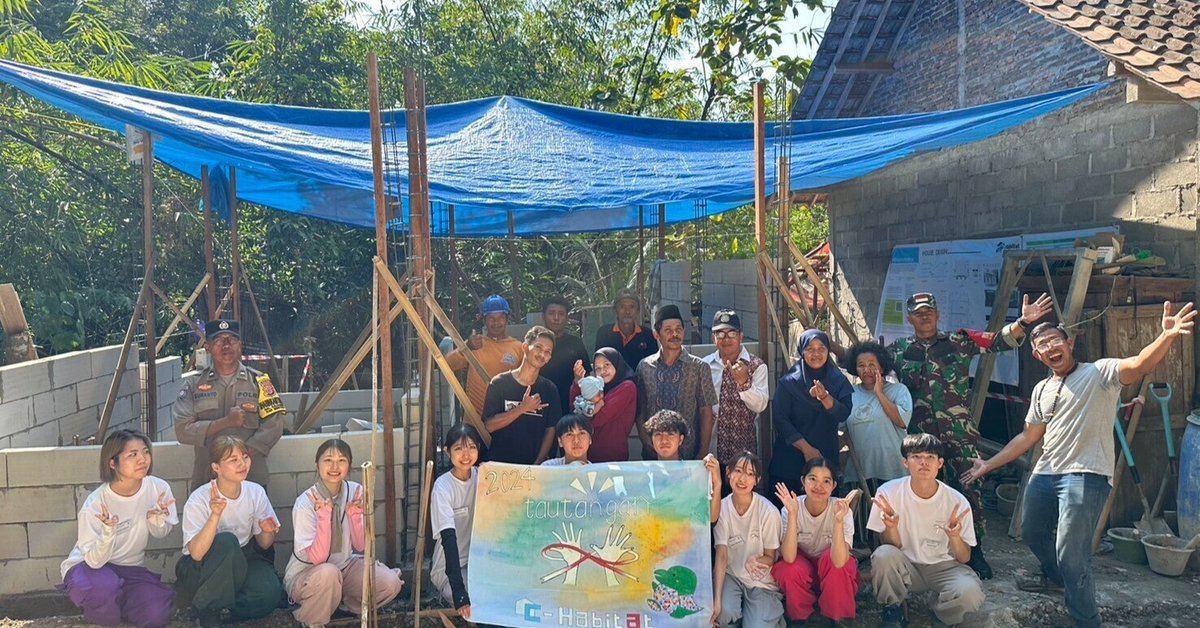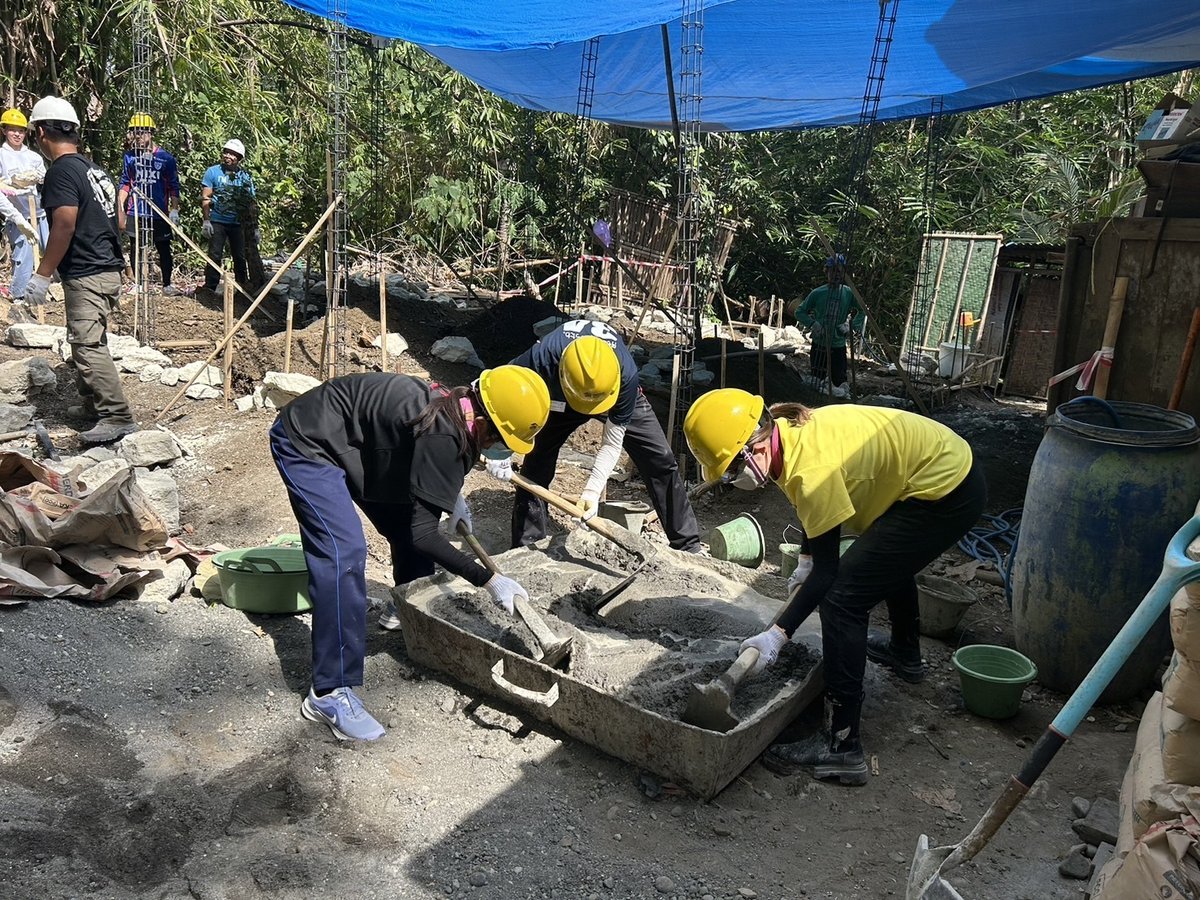
Japanese student volunteers active at home and abroad Chuo students help build houses in Java, Indonesia 学生ボランティアが国内外で活発な活動中央大生はインドネシア・ジャワ島で住宅建設を支援
Many Japanese universities have student volunteer groups that engage in various activities both at home and abroad. Is it really meaningful for students without specialized knowledge to participate in such volunteer work? This summer, nine students from Chuo University’s volunteer group C-Habitat visited the Special Region of Yogyakarta in Central Java, Indonesia, to take part in housing construction support activities. What did they gain from their experience? Hakumon Herald interviewed some of the students about what they thought of their activity.
C-Habitat is a student organization at Chuo University that supports Habitat for Humanity, an international NGO based in Atlanta, the United States. It has 288 members at present. Similar student organizations like C-Habitat exist at 32 other universities across Japan.
多くの大学には学生のボランティア・グループが存在し、国内外でさまざまな活動を行っている。専門知識を持ち合わせない学生たちがこうしたボランティア活動を行うことに果たして意味があるのだろうか。今年の夏、中央大学のボランティア・グループ「C-Habitat」 に加わる9人が、インドネシアのジャワ島中南部ジョクジャカルタ特別州を訪れ、住宅建設支援活動に参加した。彼らがそこで得たものは何か、ボランティア活動の意義を探ってみた。
C-Habitatは、米国に本部を置く国際NGO団体「ハビッタット・フォー・ヒューマニティ(Habitat for Humanity)」を支援する中央大学の学生団体で、現在288人の学生が所属している。日本には、C-Habitatのような学生団体が全国の大学33校にある。

作業風景 家屋の基盤となるコンクリートを作る学生たち
Housing situation remain serious
いまだ深刻な住宅事情
According to the United Nations Information Center, approximately 1.6 billion people, or about 20% of the world’s population, live in inadequate housing, with around 1 billion residing in slums or informal settlements. Indonesia, with a population of 270 million, is making rapid progress in economic development, registering a GDP growth rate of 5.5% in the first half of 2024. However, its rapid urbanization and population growth have led to a chronic housing shortage, with supply unable to meet new housing demand. Rising costs have made it increasingly difficult for low-income people to secure housing.
In light of this situation, student volunteers have been chosen to engage in housing support activities by Habitat for Humanity as part of its Global Village Program (GV). The organization has been running such programs in 24 countries since 1988.
The nine Chuo students were sent to Indonesia to support foundation and exterior housing construction work for two weeks from August 12. They not only assisted in building but also came in contact with local residents to discuss various topics such as each other's religious belief, view of life and food culture, thereby deepening their understanding of Indonesia. Upon returning to Japan, they held a debriefing session at Chuo's Myogadani campus, reporting on the housing situation in Indonesia and their future awareness-raising activities.
国連広報センターによると、世界人口の約2割にあたる約16億人が不適切な住居で暮らしており、そのうち約10億人がスラムや不法居住地で生活しているという。
人口2億7千万のインドネシアは、今年上半期にGDP(国内総生産)成長率が5.5%を記録するなど経済発展を遂げている。一方で経済成長に伴う急激な都市化と人口増加により、新規住宅需要に対する供給量は不足し、慢性的住宅不足に直面している。とくに物価高騰と相まって、低所得者にとって住まいを持つことが一層困難になっている。
こうした状況を踏まえ、学生ボランティアがハビッタット・フォー・ヒューマニティの下で、「海外建築ボランティアプログラム(Global Village Program=GV)」の一環として、住宅支援活動を行うことになった。ハビッタット・フォ・ヒューマニティは1988年から、世界24カ国でこうしたプログラムを展開している。
中大の学生9人は8月12日から2週間、現地に派遣された。住宅建設の基礎工事から外装工事までの活動を支援するだけでなく、現地の人々と触れ合う中で、互いの宗教観、人生観、食文化について語り合い、知見を深めることができたという。学生らは帰国後、中央大学茗荷谷キャンパスで活動報告会を開き、インドネシアの住宅事情や今後の啓発活動について報告した。
Getting aware of problems, deepening human interactions
問題意識を持ち、人との交流を深める
What is the significance of student volunteer activity and what is expected of students? Ari Wibawa, a staff member of Habitat for Humanity Indonesia who worked with the Chuo students, told Hakumon Herald, “What I expect of them is not just their help in the construction of houses. Their participation in GV brings various benefits to the local community, creating life-changing experiences for both the students and members of the community. I hope they share their experiences and broaden the impact they may have."
Hakumon Herald also interviewed some of the students. Shiho Mizoe, a freshman at the Faculty of Law, said, “Our strength lies in our ability to communicate various things without being constrained by our positions, along with our use of communication tools like social media, which is unique to the younger generation. Therefore, even after our activities ended, we want to continue sharing our experiences and raise people’s awareness.”
Haruya Takahashi, a junior at the Faculty of Economics remarked, "Having been in Indonesia for interaction with local people allowed me to directly confront the issue they face and let me have a sense of ownership toward the housing problem." He also added, "Through these interactions, I had chances to encounter new values. I hope to apply what I learned to my future life and share it with others.”
Volunteer students will face global issues head-on, expand their knowledge and communicate their experiences. This will serve them as a reference for their future career choice. Their volunteer activities may not directly lead up to problem-solving. However, the students who bear the future era will think seriously about various issues and deepen human connections. This encapsulates the very essence of student volunteering.
(By Hinata Sato)
学生ボランティアの意義とは何か、学生に何を期待するのか。現地でともに活動したハビッタット・フォ・ヒューマニティ(Habitat for Humanity)インドネシア支部の職員であるアリ・ウィバワ(Ari Wibawa)は「私が学生に期待するのは住宅建築そのものではない。学生がG Vに参加することで現地コミュニティにとってさまざまな効果をもたらしており、学生と現地のコミュニティにとって⼈⽣を変える経験となっている。現地での経験を共有し、その効果を広めることを私は期待している」と、話す。
また、活動に実際に参加した学生にも話を聞いた。法学部一年の溝江志歩は「私たちの活動における強みは、立場にとらわれずにさまざまなことを発信することと、SNSなどといった若い世代ならではのコミュニケーションツールを持っていることです。だから、ここでの活動が終わっても、経験を発信し続けて、啓発を行っていきたい」と語る。
また、経済学部三年の高橋晴也は、「実際に現地に行って現地の人々と交流し、問題を直視することのできる環境に身を置いたからこそ、当事者意識を持つことができ、住宅問題に対し真摯に考えることができた。」と言う。「現地の人との交流を通して新たな価値観に出会う機会にも恵まれた。これらを自身の今後の人生に生かし、人々と共有していきたい」とも語る。
学生が世界の諸問題に正面から向き合い、知見を広げ、それを発信する。そして自身の進路選択の参考にする。学生のボランティア活動が問題解決に直接つながることはないかもしれないが、これからの時代を担っていく学生たちはさまざまな問題について考え、人と人とのつながりを深めていくことができる。これが学生ボランティアの存在意義そのものと言えるだろう。
(佐藤ひなた)
この記事が気に入ったらサポートをしてみませんか?
